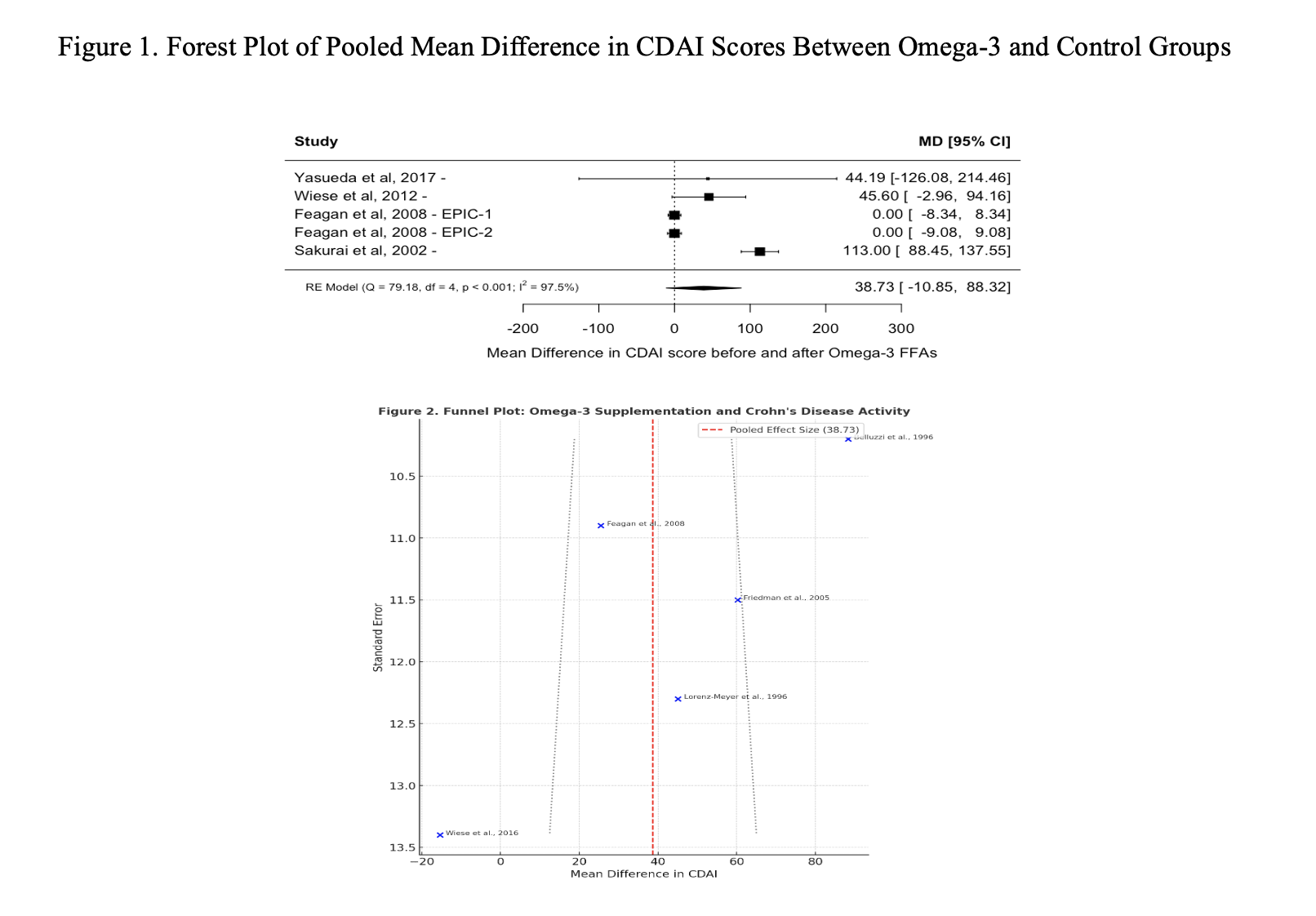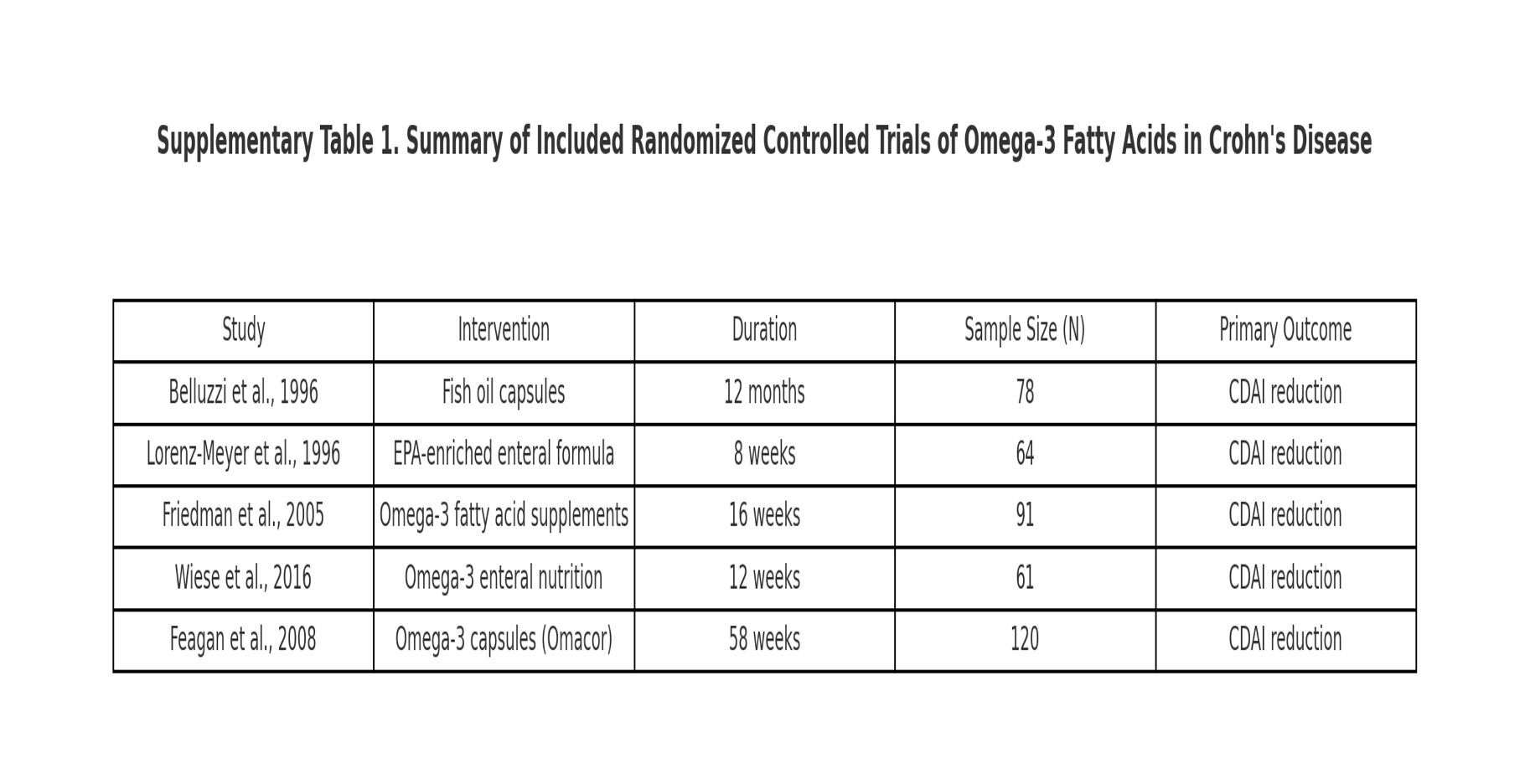Sunday Poster Session
Category: IBD
P1025 - Effect of Omega-3 Free Fatty Acid Supplementation on Crohn’s Disease: A Meta-Analysis of Randomized Controlled Trials
Sunday, October 26, 2025
3:30 PM - 7:00 PM PDT
Location: Exhibit Hall
- RU
Rafat Uddin, MS
SUNY Downstate Health Sciences University
Brooklyn, NY
Presenting Author(s)
Anwar Uddin, MD, Madia Ahad, MD, Peter Lymberopoulos, MD, Rafat Uddin, MS, Savanna Thor, DO, MPH
SUNY Downstate Health Sciences University, Brooklyn, NY
Introduction: Crohn’s disease is a chronic inflammatory bowel disorder characterized by recurrent flares and remission. Omega-3 polyunsaturated fatty acids primarily EPA and DHA have been considered for their anti-inflammatory potential, but clinical trial findings have been inconsistent. This meta-analysis evaluates the effect of omega-3 supplementation on disease activity by analyzing randomized controlled trials that report changes in Crohn’s Disease Activity Index (CDAI) scores.
Methods: A PubMed search identified randomized controlled trials evaluating omega-3 fatty acid supplementation on CDAI scores in adults with Crohn’s disease. Five studies met inclusion criteria, totaling 414 participants. Data were analyzed using a random-effects model. Heterogeneity was assessed with I², tau-squared (τ²), and Cochran’s Q. A funnel plot was used to visually assess publication bias.
Results: Five randomized controlled trials (n = 414) were included. The pooled mean difference in CDAI scores between omega-3 and control groups was 38.73 (95% CI: -10.85 to 88.32, p = 0.126), showing no statistically significant effect. Heterogeneity was high (I² = 97.5%, τ² = 2674.12, Q = 79.18, p < 0.0001). Differences in interventions contributed: Belluzzi et al. used 12-month fish oil capsules; Lorenz-Meyer et al., an 8-week EPA-enriched enteral formula; Feagan et al., Omacor for 58 weeks. Variations in dosage, duration, delivery route (oral vs. enteral), and outcome definitions were noted. Funnel plot appeared symmetric aside from one outlier (Wiese et al., 2016), but formal bias testing wasn’t done due to limited study number and wide standard errors. Though not statistically significant, several studies showed favorable trends. Variability in formulation, dose, duration, and baseline disease may have contributed to heterogeneity. These findings emphasize the need for standardized trial designs to clarify omega-3’s role in Crohn’s disease.
Discussion: This meta-analysis found no statistically significant improvement in CDAI scores with omega-3 supplementation in Crohn’s disease. While several studies showed a favorable trend, the pooled estimate was limited by wide confidence intervals and marked heterogeneity. Variability in formulation, dose, duration, and delivery likely contributed to inconsistent outcomes. These results highlight the need for future randomized trials with standardized omega-3 protocols and stratified designs to better define their role in Crohn’s disease management.

Figure: Figure 1 and 2: Forest Plot and Funnel Plot

Figure: Table 1: Summary of Studies
Disclosures:
Anwar Uddin indicated no relevant financial relationships.
Madia Ahad indicated no relevant financial relationships.
Peter Lymberopoulos indicated no relevant financial relationships.
Rafat Uddin indicated no relevant financial relationships.
Savanna Thor indicated no relevant financial relationships.
Anwar Uddin, MD, Madia Ahad, MD, Peter Lymberopoulos, MD, Rafat Uddin, MS, Savanna Thor, DO, MPH. P1025 - Effect of Omega-3 Free Fatty Acid Supplementation on Crohn’s Disease: A Meta-Analysis of Randomized Controlled Trials, ACG 2025 Annual Scientific Meeting Abstracts. Phoenix, AZ: American College of Gastroenterology.
SUNY Downstate Health Sciences University, Brooklyn, NY
Introduction: Crohn’s disease is a chronic inflammatory bowel disorder characterized by recurrent flares and remission. Omega-3 polyunsaturated fatty acids primarily EPA and DHA have been considered for their anti-inflammatory potential, but clinical trial findings have been inconsistent. This meta-analysis evaluates the effect of omega-3 supplementation on disease activity by analyzing randomized controlled trials that report changes in Crohn’s Disease Activity Index (CDAI) scores.
Methods: A PubMed search identified randomized controlled trials evaluating omega-3 fatty acid supplementation on CDAI scores in adults with Crohn’s disease. Five studies met inclusion criteria, totaling 414 participants. Data were analyzed using a random-effects model. Heterogeneity was assessed with I², tau-squared (τ²), and Cochran’s Q. A funnel plot was used to visually assess publication bias.
Results: Five randomized controlled trials (n = 414) were included. The pooled mean difference in CDAI scores between omega-3 and control groups was 38.73 (95% CI: -10.85 to 88.32, p = 0.126), showing no statistically significant effect. Heterogeneity was high (I² = 97.5%, τ² = 2674.12, Q = 79.18, p < 0.0001). Differences in interventions contributed: Belluzzi et al. used 12-month fish oil capsules; Lorenz-Meyer et al., an 8-week EPA-enriched enteral formula; Feagan et al., Omacor for 58 weeks. Variations in dosage, duration, delivery route (oral vs. enteral), and outcome definitions were noted. Funnel plot appeared symmetric aside from one outlier (Wiese et al., 2016), but formal bias testing wasn’t done due to limited study number and wide standard errors. Though not statistically significant, several studies showed favorable trends. Variability in formulation, dose, duration, and baseline disease may have contributed to heterogeneity. These findings emphasize the need for standardized trial designs to clarify omega-3’s role in Crohn’s disease.
Discussion: This meta-analysis found no statistically significant improvement in CDAI scores with omega-3 supplementation in Crohn’s disease. While several studies showed a favorable trend, the pooled estimate was limited by wide confidence intervals and marked heterogeneity. Variability in formulation, dose, duration, and delivery likely contributed to inconsistent outcomes. These results highlight the need for future randomized trials with standardized omega-3 protocols and stratified designs to better define their role in Crohn’s disease management.

Figure: Figure 1 and 2: Forest Plot and Funnel Plot

Figure: Table 1: Summary of Studies
Disclosures:
Anwar Uddin indicated no relevant financial relationships.
Madia Ahad indicated no relevant financial relationships.
Peter Lymberopoulos indicated no relevant financial relationships.
Rafat Uddin indicated no relevant financial relationships.
Savanna Thor indicated no relevant financial relationships.
Anwar Uddin, MD, Madia Ahad, MD, Peter Lymberopoulos, MD, Rafat Uddin, MS, Savanna Thor, DO, MPH. P1025 - Effect of Omega-3 Free Fatty Acid Supplementation on Crohn’s Disease: A Meta-Analysis of Randomized Controlled Trials, ACG 2025 Annual Scientific Meeting Abstracts. Phoenix, AZ: American College of Gastroenterology.

